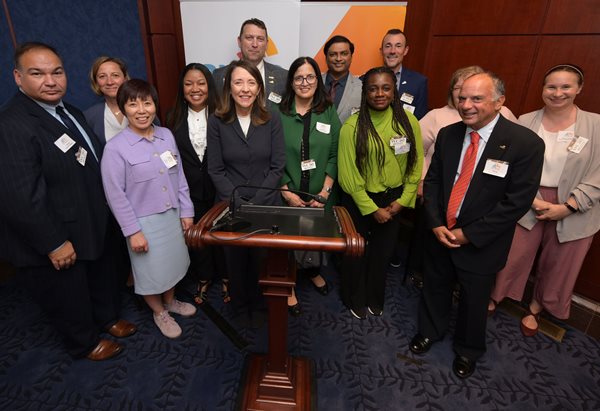NSF Engines Awards Show AUTM's Support of CHIPS Act is Paying Off Big for Tech Transfer

Andrew J. Maas, JD, LLM, RTTP
Incoming AUTM Board Chair
Associate Vice President for Research – Innovation and Ecosystem Development, Louisiana State University
The US National Science Foundation’s announcement of its 10 inaugural Regional Innovation Engines—each of which will receive up to $160 million in grant funding—shows that the CHIPS and Science Act is already paying off for academic tech transfer in a big way. I’m personally honored to lead one of these Engines teams at LSU.
At LSU, I led the efforts for the NSF Engine: Louisiana Energy Transition Engine and formed the Future Use of Energy in Louisiana (FUEL) consortium to spearhead the project. This has been a long process, but the effort and teamwork has paid off. In addition to the $160 million from NSF, Louisiana Economic Development has committed an additional $67.5 million in support of faculty, staff and technology transfer hiring across the state. Our project is focused on ensuring the energy industy in Louisiana is sustainable, grows to meet the energy transition needs of our country, and supports a diverse and inclusive research, jobs, and commercialization effort. This was a herculean effort, with more than 65 organizations and 165 individuals across the state involved in the planning, development and finalization of our proposal.
While we are celebrating a win at LSU, I’m equally proud of the work done by the AUTM Board, Association Members and others in the profession to ensure the CHIPS Act included language authorizing this level of investment in the work we do. The AUTM Board has taken advocacy to a new level in the last few years, and many Board Members’ interactions with policy makers on Capitol Hill in 2022 were focused on helping the CHIPS Act gain support in the Senate and the House of Representatives without compromising the funds for boosting academic tech transfer capacity.
On July 21, 2022, the Board gathered on Capitol Hill to honor Senators Thom Tillis and Chris Coons—both longtime proponents of tech transfer—with AUTM’s first Innovation MVP Awards and check in with other like-minded policy makers. Less than a week later, first the Senate and then the House voted to approve the CHIPS Act with the critical tech transfer language intact. On August 9, President Biden signed it into law. You connect the dots.
Now, 18 months later, at least three different federal funding projects are turning the CHIPS Act’s innovation-driven authorizations into allocations.
In December, academic research institutions were awarded more than $100 million through the NSF’s Accelerating Research Translation program. Meanwhile, the Economic Development Administration is in the second phase of the selection process for its Tech Hubs funding opportunity, through which five to 10 regional commercialization teams—each of which includes one institution of higher education—will share up to $500 million in grants authorized by the CHIPS Act.
But the Engines program is the CHIPS Act’s biggest payoff yet—a $1.6-billion vote of confidence in the American innovation ecosystem, and one of the single largest broad investments in place-based research and development in the nation’s history.
Each NSF Engine will initially receive up to $15 million for two years. NSF's initial investment in these 10 regions is being matched nearly two to one in commitments from state and local governments, other federal agencies, philanthropy and private industry. Teams that demonstrate progress toward well-defined milestones could potentially receive up to $160 million each from NSF over 10 years.
As with EDA’s Tech Hubs, every NSF Engine has at least one academic research institution on its team—along with nonprofits, businesses, federal laboratories and other innovation stakeholder organizations—and there are at least 30 universities represented among the 10 teams. Six Engines—more than half—have a university as the team lead, and I’m proud to say that LSU is one of them. Louisiana’s FUEL consortium includes 11 universities, five of which are Historically Black Colleges and Universities.
Click here to see the full list of NSF Engines and learn more about each one. And get ready for a decade of incredible innovation, courtesy of the CHIPS Act and all the AUTM Members who helped make it happen.
On behalf of the AUTM Board, I congratulate all of the AUTM Members that have been involved in the CHIPS Act funding opportunities in the past year – NSF Engines Builder Grants, EDA Tech Hubs Designation and Planning Grants, NSF ART Grants and the NSF Engines Type-2 Awards. You all deserve a round of applause!

After the signing of the CHIPS and Science Act in 2022, the AUTM Board still had work to do on Capitol Hill to make sure the funds authorized for tech transfer in the legislation were actually allocated. This photo shows Board Members with Sen. Maria Cantwell (D-WA) one of AUTM's 2023 Innovation MVPs along with Sen. Roger Wicker (R-MS). See more photos from the 2023 event here.